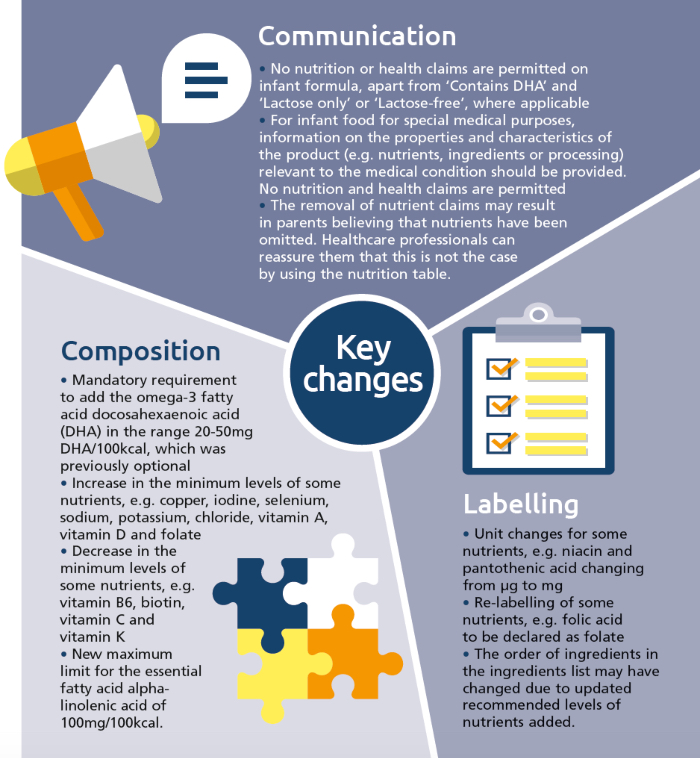2. New formula milk legislation
In Further info
Follow this topic
Bookmark
Record learning outcomes
With legislative changes to infant formulations now in force, what do pharmacy teams need to know about the latest regulations and how can they support parents with questions or concerns?
The nutritional composition of all infant formula, follow-on formula and infant food for special medical purposes (FSMPs) now comply with the changes set out in the EU Delegated Regulation 2016/127 and EU Delegated Regulation 2016/128, which came into force on 22 February 2020.

Parents may look to pharmacy teams for reassurance, advice and answers to questions they might have. It is therefore important for all members of staff to be aware of the changes so they can best support the parents of combination or bottle-fed infants.
 Important
Important
Breastfeeding is best for babies. Infant formula is suitable from birth when babies are not breastfed. It is recommended that all infant formula milk be used on the advice of a doctor, midwife, health visitor, public health nurse, dietitian, pharmacist, pharmacy technician or other professional responsible for maternal and child care.
What’s changed?
The key purpose of the legislation is to ensure that baby milks and specialist milks from all manufacturers provide the appropriate nutrients for babies in the appropriate amounts and are safe to use. The recent updates enhance the existing regulations and reflect the latest scientific advances in nutrition so as to give babies who are not breastfed the best start.
The changes update, but largely retain, the existing rules, however there are three main areas of change:
- Changes in mandatory, minimum and maximum nutrient levels
- Changes in the presentation of the nutrition table and ingredients list
- Further restrictions on claims that can be made about the milks.
These changes only apply to infant, follow-on and specialist milks. Growing up milks are unaffected by the legislative changes. Hydrolysed infant and follow-on formulas must comply by 22 February 2021.
These changes only apply to infant, follow-on and specialist milks. Growing up milks are unaffected by the legislative changes
The impact
While some products on the market were already compliant with these new requirements, some products have been reformulated and the new recipes are typically flagged with stickers to highlight that the formula has changed. There are also some changes to the labels for some products to reflect the reformulations and permitted nutritional declarations.
Parents may notice a slight difference in the smell, appearance and/or taste of the formulation, which is completely normal and due in part to the higher DHA content as this is derived from fish oil. A change in stool consistency and/or frequency can sometimes occur when babies are switching formula and this is also perfectly normal. Settling issues may be noticed but these should be temporary and minimal.
Babies should be kept on the formula for at least five days to give them time to settle. In the meantime, parents should be reassured that formulation changes are based on the latest scientific evidence and made for the benefit of their baby’s nutrition. Any concerned parents should be signposted to the formula milk manufacturer’s careline or a healthcare professional for further information and support.

